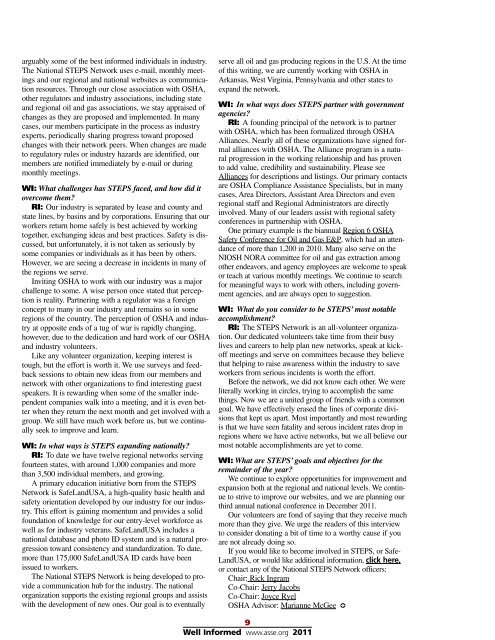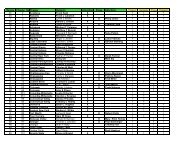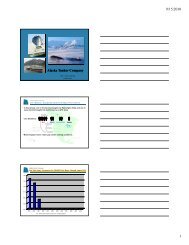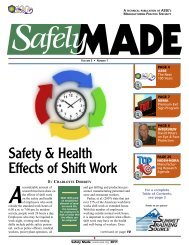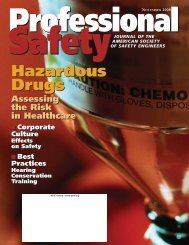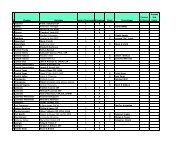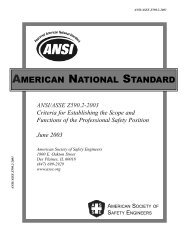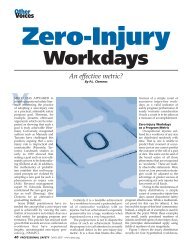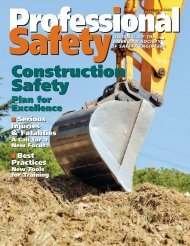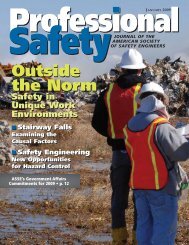OSHA's Flame-Resistant Clothing Policy - ASSE Members
OSHA's Flame-Resistant Clothing Policy - ASSE Members
OSHA's Flame-Resistant Clothing Policy - ASSE Members
Create successful ePaper yourself
Turn your PDF publications into a flip-book with our unique Google optimized e-Paper software.
arguably some of the best informed individuals in industry.The National STEPS Network uses e-mail, monthly meetingsand our regional and national websites as communicationresources. Through our close association with OSHA,other regulators and industry associations, including stateand regional oil and gas associations, we stay appraised ofchanges as they are proposed and implemented. In manycases, our members participate in the process as industryexperts, periodically sharing progress toward proposedchanges with their network peers. When changes are madeto regulatory rules or industry hazards are identified, ourmembers are notified immediately by e-mail or duringmonthly meetings.WI: What challenges has STEPS faced, and how did itovercome them?RI: Our industry is separated by lease and county andstate lines, by basins and by corporations. Ensuring that ourworkers return home safely is best achieved by workingtogether, exchanging ideas and best practices. Safety is discussed,but unfortunately, it is not taken as seriously bysome companies or individuals as it has been by others.However, we are seeing a decrease in incidents in many ofthe regions we serve.Inviting OSHA to work with our industry was a majorchallenge to some. A wise person once stated that perceptionis reality. Partnering with a regulator was a foreignconcept to many in our industry and remains so in someregions of the country. The perception of OSHA and industryat opposite ends of a tug of war is rapidly changing,however, due to the dedication and hard work of our OSHAand industry volunteers.Like any volunteer organization, keeping interest istough, but the effort is worth it. We use surveys and feedbacksessions to obtain new ideas from our members andnetwork with other organizations to find interesting guestspeakers. It is rewarding when some of the smaller independentcompanies walk into a meeting, and it is even betterwhen they return the next month and get involved with agroup. We still have much work before us, but we continuallyseek to improve and learn.WI: In what ways is STEPS expanding nationally?RI: To date we have twelve regional networks servingfourteen states, with around 1,000 companies and morethan 3,500 individual members, and growing.A primary education initiative born from the STEPSNetwork is SafeLandUSA, a high-quality basic health andsafety orientation developed by our industry for our industry.This effort is gaining momentum and provides a solidfoundation of knowledge for our entry-level workforce aswell as for industry veterans. SafeLandUSA includes anational database and photo ID system and is a natural progressiontoward consistency and standardization. To date,more than 175,000 SafeLandUSA ID cards have beenissued to workers.The National STEPS Network is being developed to providea communication hub for the industry. The nationalorganization supports the existing regional groups and assistswith the development of new ones. Our goal is to eventuallyserve all oil and gas producing regions in the U.S. At the timeof this writing, we are currently working with OSHA inArkansas, West Virginia, Pennsylvania and other states toexpand the network.WI: In what ways does STEPS partner with governmentagencies?RI: A founding principal of the network is to partnerwith OSHA, which has been formalized through OSHAAlliances. Nearly all of these organizations have signed formalalliances with OSHA. The Alliance program is a naturalprogression in the working relationship and has provento add value, credibility and sustainability. Please seeAlliances for descriptions and listings. Our primary contactsare OSHA Compliance Assistance Specialists, but in manycases, Area Directors, Assistant Area Directors and evenregional staff and Regional Administrators are directlyinvolved. Many of our leaders assist with regional safetyconferences in partnership with OSHA.One primary example is the biannual Region 6 OSHASafety Conference for Oil and Gas E&P, which had an attendanceof more than 1,200 in 2010. Many also serve on theNIOSH NORA committee for oil and gas extraction amongother endeavors, and agency employees are welcome to speakor teach at various monthly meetings. We continue to searchfor meaningful ways to work with others, including governmentagencies, and are always open to suggestion.WI: What do you consider to be STEPS’ most notableaccomplishment?RI: The STEPS Network is an all-volunteer organization.Our dedicated volunteers take time from their busylives and careers to help plan new networks, speak at kickoffmeetings and serve on committees because they believethat helping to raise awareness within the industry to saveworkers from serious incidents is worth the effort.Before the network, we did not know each other. We wereliterally working in circles, trying to accomplish the samethings. Now we are a united group of friends with a commongoal. We have effectively erased the lines of corporate divisionsthat kept us apart. Most importantly and most rewardingis that we have seen fatality and serous incident rates drop inregions where we have active networks, but we all believe ourmost notable accomplishments are yet to come.WI: What are STEPS’ goals and objectives for theremainder of the year?We continue to explore opportunities for improvement andexpansion both at the regional and national levels. We continueto strive to improve our websites, and we are planning ourthird annual national conference in December 2011.Our volunteers are fond of saying that they receive muchmore than they give. We urge the readers of this interviewto consider donating a bit of time to a worthy cause if youare not already doing so.If you would like to become involved in STEPS, or Safe-LandUSA, or would like additional information, click here,or contact any of the National STEPS Network officers:Chair: Rick IngramCo-Chair: Jerry JacobsCo-Chair: Joyce RyelOSHA Advisor: Marianne McGee 9Well Informed www.asse.org 2011


